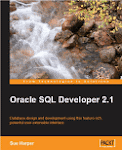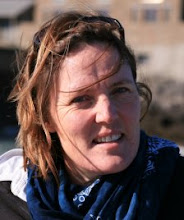Today's keynotes saw two old familiar faces; Marco Tilli and Sohaib Abassi, both long time friends of the conference and in their time, were Volley Ball players on whichever beach or piece of sand wherever that year's ODTUG conference was being held. Back, this time not talking about Forms, Portal or Designer, but how we should all by now be more aware of SOA, of how business services can be reused, of integration and of the whole importance of data integration and its importance in the industry today.
With Java and the whole J2EE explosion, ODTUG have had to reinvent themselves. Something I was not sure they'd do with success, but I think they have cracked it. The halls are buzzing with old familiar faces. Some developers are not currently working with Oracle technology, yet still they return, the contacts and friends made at this event too important to lose. Other developers are reinventing themselves, learning new technology and bringing wisdom and experience to the table. This year, not too many grumpy old men!
Interesting too was the large number of first timers at the conference this year. I'm always amazed at this, the number of newbies arriving at the various conferences I attend. It's always a healthy percentage.
This year's ODTUG conference offers half day hands-on sessions alongside regular presentations. The weekend prior to the event, they ran a full day Web Architecture Symposium, which I have only heard highest praise for, and a couple of full day hands on sessions. I'd say attendees can get their monies worth if they participate in all on offer, specially if they get involved and mingle and talk, listen and learn!
Peer Reviews
The first talk I attended was Kent Graziano's talk, "Data Design Reviews: Using Extreme Humiliation to Ensure Quality Data Models". What a title!
Using the peer reviews they use within his department as a basis for his talk, he told us about building effective data models. They have a fixed set of standards, build logical models, which must conform to those standards, and have rigorous peer reviews. Once accepted, these logical models are then transformed to physical models, which have to conform to standards, and then have rigorous reviews of these. If and when these all pass and are accepted, the DDL is generated and reviewed before being passed on to the department that consumes them. They do not spend months on building models before reviews, but have incremental builds, so the review is brief, less than an hour, and they have them often.
I think the rigorous could be scary, specially for new folk, but the peer to peer knowledge transfer and the team work must outweigh any disadvantages. I loved the sound of the approach. (Specially having seen a few sick models in my time) I also think this practice can and should be translated to any part of a company - from those writing coding, to those writing papers and producing power point presentations. You might think this would slow down the pace, but I suspect teams would be more efficient, and the resulting work of a much higher quality.
Aah, by the way, Kent stressed, "it's business, it's not personal" For example in a peer review, when you criticize the name of entity, it's not because you don't like it, it's because it doesn't comply to the standard. I think so often we are too defensive, we assume someone is critiquing us, our approach, but if you have a set of standards, then things are less subjective and in the end, better for the good of the project and in the end, the company.
If you can, take a look at Kent's paper on the ODTUG site. It should be up after the conference. Kent is also author of a few books on data models, if you are on the lookout for one.
If you can, take a look at Kent's paper on the ODTUG site. It should be up after the conference. Kent is also author of a few books on data models, if you are on the lookout for one.






6 comments:
... i didn't understand most of what you were writing about, especially all those acronyms ... but kent's model reminds me of one of the keys to success from the miguel's 4 agreements...
'don't take anything personal'
confidence in your own personal idea or agenda and realizing that everything anyone says is either given to you to discard or to use to perfect your idea ... that perspective helps so much especially if you are a sensitive person.
thanks for letting me vicariously go to such a techie conference ... i'm more the after-hours party kinda networker.
peace & harmony,
elaine
'freedom must be exercised to stay in shape!'
Ken is as wise as his hair is long (which makes him very wise indeed). And he is another one of those absolutely brilliant folks from the Rocky Mountains of Colorado.
I think peer reviews, whether they are formal or informal, one on one or in a group, are incredibly valuable. In a good organization, they promote a better understanding of the systems, more cooperation between different groups, and ultimately better applications and systems. If you are developing an application, writing a script, architecting a new system, you will hold yourself to a higher standard if you know that you are going to have to 'defend' your work to your peers. That alone should make your work better before anyone else ever sees it.
When you discuss your work with peers, you bring different perspectives, different experiences, different ideas into the process. You might have a simple script to perform a task, but Joe DBA might have experience with a certain new feature that your script could make use of, which makes the script run faster and be less likely to encounter an error.
Kent's wisdom does indeed exceed the length of his hair (and- unlike his hair- reamins as thick as ever ;). The brilliance of Kent was in getting buyoff from the user community for this and his obvious ability to keep such meetings short and on-track. That 'meeting' skil is what many lack (including- sadly- myself).
And Sue, as far as the grumpy old men comment: They heard from one missing grumpy old man that you'd hunt up the nearest shark pen, if needed :)) I would take umberage with that remark, except the truth in it is too glaring to avoid for the Troll.
Sounds like the conference went well; it sure had to be better than getting offspring irradiated.
aah Mike, still too sensitive about the grumpiness. ;-) I meant that the people at the conference were all positive this year! Which was good.
Sue
Thanks for the nice review Sue and the remarks on my wisdom Dan & Mike (hey Mike - at least I have some hair left to thin...)
Here is the link in the new ODTUG Expert Area site where you can find my paper: http://www.odtug.com/pls/htmldb/f?p=500:900:1498376047679854064::::P900_EXPERT_AREA_ID:23
Enjoy and use with caution! Some people will take it personally.
Yea, Kent; the trees have died, so I grew out the roots recently to see what they look like. I'll have to refresh my blogger photo with the beard (which the wife thinks give me a Sean Connery look; based on that, I'll keep it awhile.)
The new ODTUG site looks great! (though, as a grumpy old man, I guess I have to complain about something; the color scheme a tad too bright ;)
I myself have never questioned how far HTMLDB and Web PL/SQL in general can go and fully expect the successful deployment percentage will be far higher than Java projects. Got hauled back into the expansion of one I worked on if Florida a couple years ago. More work with the 'mature' Designer WSG; they'd make the jump to Apex if it were Repository based.
Post a Comment